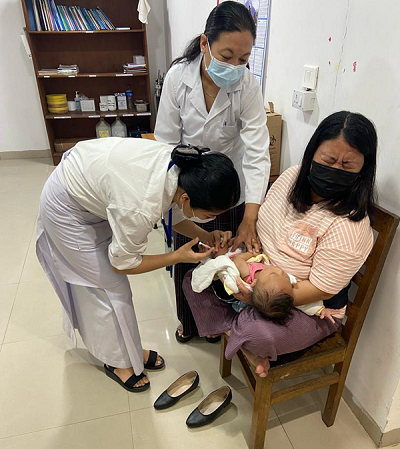Joint national/international EPI and vaccine preventable disease surveillance review in Bhutan
 Dates: 19-29 March 2024, Bhuthan.
Dates: 19-29 March 2024, Bhuthan.
Participants: National ITAG members and medical officers, WHO and UNICEF country office technical officers, subject experts from US-CDC, WHO SEARO, UNICEF ROSA and a representative of the NITAG Thailand
Overview: This joint national/international Expanded Programme on Immunization (EPI) and vaccine preventable disease surveillance review assessed the implementation of the current cMYP 2019-2023 and achievement of specific EPI priority targets, especially rubella/CRS elimination by 2026; to inform the National Immunization Strategy (NIS) 2024-2028 to be developed following this activity. The review looked into specific challenges identified by the EPI and NITAG, such as improving immunization systems, financial sustainability, adequate human resources, supervision, monitoring and information management systems, coordination with key stakeholders in immunization and strategies to ensure adequate immunization services at all levels of the health care delivery system. The review was combined with new vaccine post-introduction evaluation (PIE) for pneumococcal conjugate vaccine (PCV), influenza and COVID-19 vaccines.
PIE data are collected on 10 principal evaluation areas which closely correlate to the basic immunization topics of an EPI review and as such combining the activities created valuable synergies and efficiencies as well as direct cross-learning. Six national / international teams visited 15 of the country’s 20 districts; covering all tiers of the health delivery system, Bhutan’s three regions, urban and rural programme delivery, sites of lower coverage and border areas. The review coverage 12% of the country’s health care facilities. Main conclusions acknowledged that Bhutan’s programme has achieved considerable success in preventing, controlling, and eliminating vaccine preventable diseases and has been pioneering in new vaccine introduction. The rapid and harmonized response to the COVID-19 pandemic has been globally lauded and maintaining high routine immunization coverage during the pandemic recognized as well as the recovery of vaccine preventable diseases (VPD) surveillance acknowledged. The foundation for success lies with the investment into primary health care (“services close to the people”) and a highly capable and dedicated health work force.
Outcomes: As a country in economic transition, continued advocacy is required for government and partner support to protect the investments and gains and the development of high-quality National Immunization Strategy 2024-2028 involving all key stakeholders is critical.
---
Author: Sigrun Roesel, Sonam Wangdi
Photo caption: Routine immunization at primary health care center in Bhutan.
